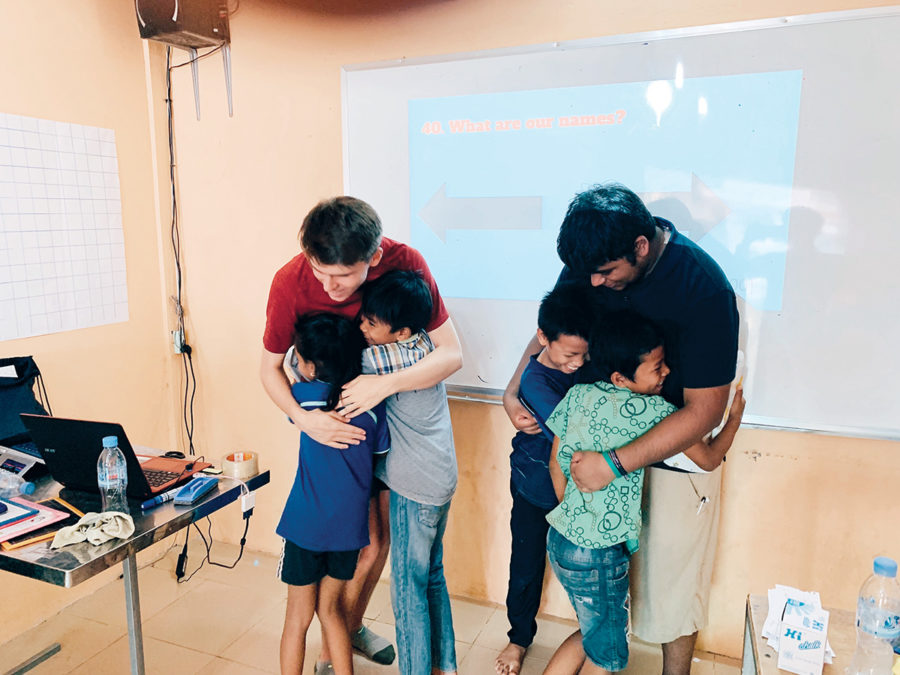Once a week throughout his sophomore year, senior William “Will” Pugh would set aside his homework for an hour or two and log onto his computer. A few moments later, a group of excited children from a rural village in Cambodia would appear on the screen, ready for their next English lesson with Pugh, their teacher.
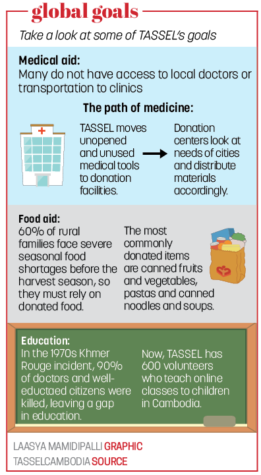 Pugh is a part of the TASSEL (Teaching And Sharing Skills to Enrich Lives) Club here at CHS. Founded in 2012, TASSEL’s mission is to train volunteers to provide free English classes over video conferencing to the poor in Cambodia as well to provide medical aid, food aid and other sustainability services to those in need. Pugh and many others involved with the club at CHS contribute to the mission by providing educational opportunities to the people in their assigned village.
Pugh is a part of the TASSEL (Teaching And Sharing Skills to Enrich Lives) Club here at CHS. Founded in 2012, TASSEL’s mission is to train volunteers to provide free English classes over video conferencing to the poor in Cambodia as well to provide medical aid, food aid and other sustainability services to those in need. Pugh and many others involved with the club at CHS contribute to the mission by providing educational opportunities to the people in their assigned village.
“We would start with the alphabet and from there, we would expand and do grammatical lessons,” Pugh said. “This year, I got the opportunity to do writing corrections. The students would send me their essays and I would correct them and help them improve on their writing abilities.”
Pugh’s involvement in the TASSEL club was not limited to a virtual conversation with his students. In the summer of 2018, Pugh, along with other students, spent one week in Cambodia working side-by-side with TASSEL volunteers to fulfill the organization’s mission. Through his trip, Pugh said he realized the true influence of the efforts of TASSEL, as well as his own, on the poor community of Cambodians.
“Poor kids are biking long distances to school to learn English. Whether it is storming outside or the sun is out shining, they are always going to school to get an education,” Pugh said. “English is essentially a huge gateway language. By learning English, these Cambodians have a global key that will allow them to do whatever they want in the world since English has become a vital language.”
The efforts of Pugh and of TASSEL are some of many that are commemorated and encouraged on a global level. According to the United Nations, to advocate for the safety and security of humanitarian aid works and for the well-being of people affected by crises, the General Assembly adopted a resolution designating Aug. 19 as World Humanitarian Day. The United Nations does not only commemorate aid workers who have risked their lives in humanitarian service on this day, but it also encourages people to mobilize for the humanitarian effort.
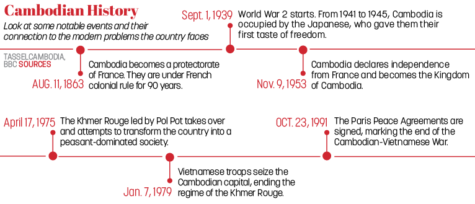 Organizations such as the American Red Cross have created opportunities for people interested in humanitarian work through volunteering. According to Duchess Adjei, communications director for the Indiana Red Cross chapter, a majority of the humanitarian efforts of the Red Cross come solely from volunteers, fulfilling the Red Cross’s mission to prevent and alleviate human suffering.
Organizations such as the American Red Cross have created opportunities for people interested in humanitarian work through volunteering. According to Duchess Adjei, communications director for the Indiana Red Cross chapter, a majority of the humanitarian efforts of the Red Cross come solely from volunteers, fulfilling the Red Cross’s mission to prevent and alleviate human suffering.
“We have five service lines for our humanitarian agency,” Adjei said. “Disaster cycle services are probably what most people know the Red Cross for. We do a lot of disaster work—everything from the little home fires to the large scale disasters such as Hurricane Harvey and Katrina.”
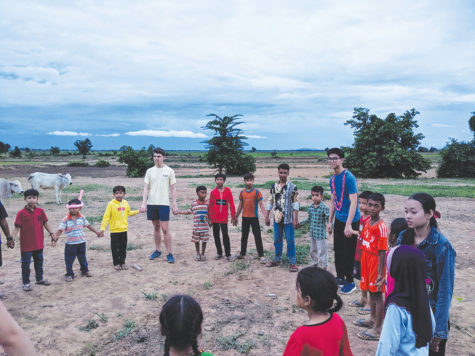
Senior William “Will” Pugh plays a game of keep-up with a group of Cambodian students. The group consisted of students from his English classes as well as those from far away villages. The past two summers, Pugh has gone on TASSEL trips to Cambodia.
While the Red Cross brings relief through providing the necessary tools such as housing, clothing and food to those in need, Adjei said an important effort volunteers can do is to provide emotional support for the victims of crises.
“When people join our mission, they are getting to work with people who are experiencing difficult times, whether you lost your home in a home fire and you just need someone to express your feelings to and hug, we have people there,” Adjei said. “A lot of what we do is dealing with people and working with them as they go through very difficult situations. We get to work with them to build some sort of resemblance of normalcy.”
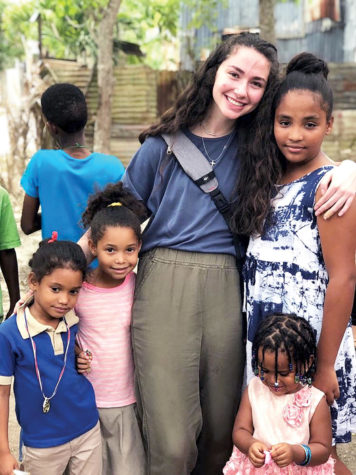
Senior Amaya Kliegl poses with girls during a mission trip in the Dominican Republic. Kliegl said during her mission trip, many of the local residents would gather in the churches with the translators.
In agreement with Adjei, senior Amaya Kliegl said bringing comfort to those in need is just as important as providing tangible aid. In April, Kliegl, along with the other members of her church parish, traveled to the Dominican Republic as a part of a mission trip. While the trip to the Dominican Republic was influenced by religious reasons, Kliegl said she and her parish were there to spread hope and give the people guidance throughout the daily hardships they may encounter.
“We went to different churches and schools every day. We were with different children and we put on different lessons or skits for them to teach them about God— mainly lessons that will help them get through the hard times,” Kliegl said. “We were trying to plant a seed in their minds, to remind them they always have someone to lean on during the hard times.”
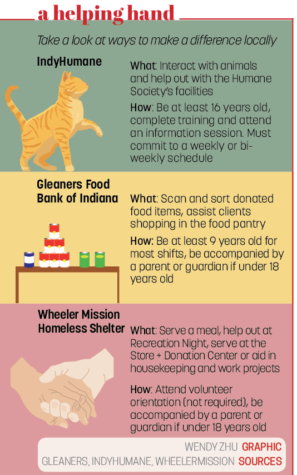 While the efforts of Pugh and Kliegl were influenced by different initiatives, both Pugh and Kliegl said they encourage others to take the opportunity to provide aid to communities in need, whether it may be locally or internationally.
While the efforts of Pugh and Kliegl were influenced by different initiatives, both Pugh and Kliegl said they encourage others to take the opportunity to provide aid to communities in need, whether it may be locally or internationally.
“It doesn’t have to be a specific reason, such as my efforts in TASSEL, that should influence you to help make a difference in the world,” Pugh said. “We tend to forget that we are privileged for living in houses with air conditioning, for having unlimited access to food and water. Just know that anything you can do in order to change the lives of anyone in need, like TASSEL’s initiative in Cambodia, will make a very big difference to them.”

Senior William “Will” Pugh teaches English to a class of Cambodian students. This is Pugh’s second trip to Cambodia with the organization TASSEL, a nonprofit organization focused on changing the lives of rural Cambodians through English education, the creation of teaching jobs, food and medicine aid and financial sponsorships.

































![What happened to theater etiquette? [opinion]](https://hilite.org/wp-content/uploads/2025/04/Entertainment-Perspective-Cover-1200x471.jpg)













































![Review: “The Immortal Soul Salvage Yard:” A criminally underrated poetry collection [MUSE]](https://hilite.org/wp-content/uploads/2025/03/71cju6TvqmL._AC_UF10001000_QL80_.jpg)
![Review: "Dog Man" is Unapologetically Chaotic [MUSE]](https://hilite.org/wp-content/uploads/2025/03/dogman-1200x700.jpg)
![Review: "Ne Zha 2": The WeChat family reunion I didn’t know I needed [MUSE]](https://hilite.org/wp-content/uploads/2025/03/unnamed-4.png)
![Review in Print: Maripaz Villar brings a delightfully unique style to the world of WEBTOON [MUSE]](https://hilite.org/wp-content/uploads/2023/12/maripazcover-1200x960.jpg)
![Review: “The Sword of Kaigen” is a masterpiece [MUSE]](https://hilite.org/wp-content/uploads/2023/11/Screenshot-2023-11-26-201051.png)
![Review: Gateron Oil Kings, great linear switches, okay price [MUSE]](https://hilite.org/wp-content/uploads/2023/11/Screenshot-2023-11-26-200553.png)
![Review: “A Haunting in Venice” is a significant improvement from other Agatha Christie adaptations [MUSE]](https://hilite.org/wp-content/uploads/2023/11/e7ee2938a6d422669771bce6d8088521.jpg)
![Review: A Thanksgiving story from elementary school, still just as interesting [MUSE]](https://hilite.org/wp-content/uploads/2023/11/Screenshot-2023-11-26-195514-987x1200.png)
![Review: "When I Fly Towards You", cute, uplifting youth drama [MUSE]](https://hilite.org/wp-content/uploads/2023/09/When-I-Fly-Towards-You-Chinese-drama.png)
![Postcards from Muse: Hawaii Travel Diary [MUSE]](https://hilite.org/wp-content/uploads/2023/09/My-project-1-1200x1200.jpg)
![Review: "Ladybug & Cat Noir: The Movie," departure from original show [MUSE]](https://hilite.org/wp-content/uploads/2023/09/Ladybug__Cat_Noir_-_The_Movie_poster.jpg)
![Review in Print: "Hidden Love" is the cute, uplifting drama everyone needs [MUSE]](https://hilite.org/wp-content/uploads/2023/09/hiddenlovecover-e1693597208225-1030x1200.png)
![Review in Print: "Heartstopper" is the heartwarming queer romance we all need [MUSE]](https://hilite.org/wp-content/uploads/2023/08/museheartstoppercover-1200x654.png)



